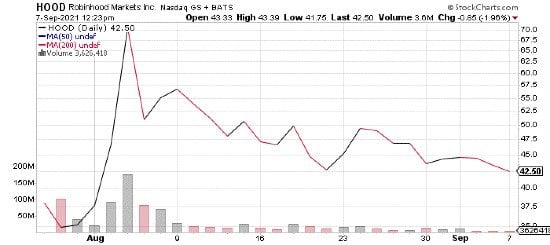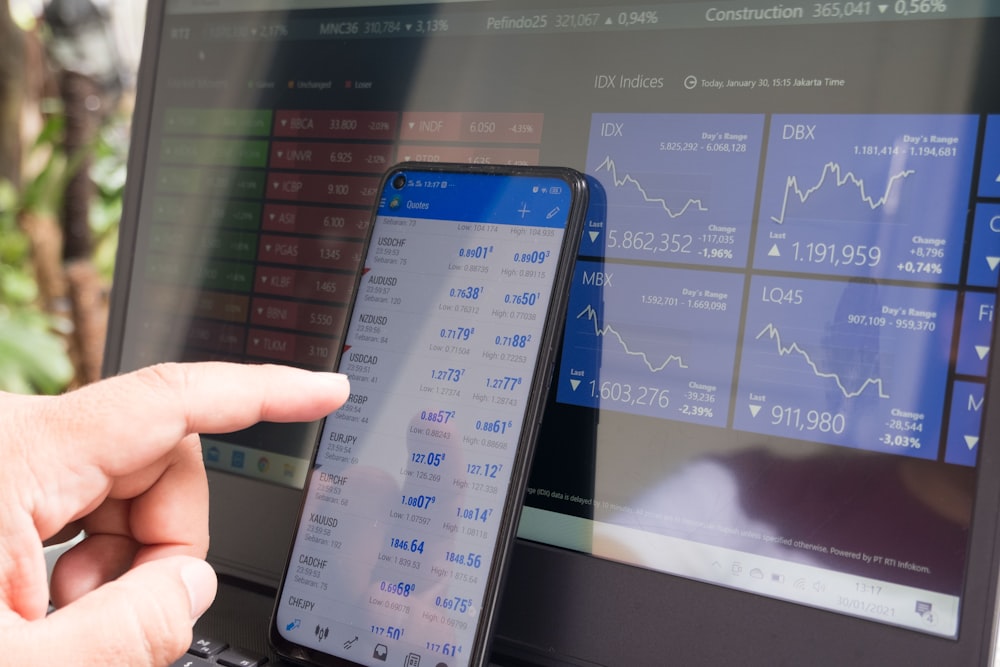The Most Important Stock To Watch This Week - Wednesday, Sept. 8
Image Source: Unsplash
Up markets, down markets - there's always a stock moving somewhere, and often enough it's moving under the radar. That's why I share my watch lists. This week's list, though, is a little shorter than most, because right now, it's all about one stock.
This company has played a bigger and bigger role over the past two years. It's not quite systemically important, like the TBTF banks, but it's been the doorway to wealth for millions of people.
I really want to watch how it trades over the next few sessions, and I think you should, too. We're getting close to "go time," when it'll be time to leap on the stock, so here's the level to look for - and a trade idea that could get you in at an even better price.
All Good in the HOOD?
Robinhood Markets Inc. (HOOD) had a less-than-smooth first month of trading after its IPO in July. It started off well enough, when the stock rocketed more than 105% in the first few trading sessions only to drop more than 30% in a trading day. The stock has been drifting lower since Aug. 24, but the selling accelerated following an unusual interview last week.
U.S. Securities and Exchange Chair Gary Gensler, speaking to Barron's magazine, said the watchdog may consider banning the practice of payment for order flow (PFOF). Robinhood has already found itself in regulatory crosshairs as the poster child for PFOF, not to mention the "game-ification" of investing and trading.
If you haven't heard of PFOF, you will. It's Robinhood's bread and butter, and how it, Fidelity, Charles Schwab, and TD Ameritrade can provide commission-free trading. In a nutshell, the discount brokerages provide a customer-facing platform whereby you can place your trade orders and the back office of the brokerages handles the money vs. securities transaction.
But none of these brokerages are trading shops, which means they're not taking customer orders and matching them up with buyers and sellers, which is to say they're not "market makers."
To match buyers with sellers, all of the discount brokerages rely on wholesalers (which are third-party trading shops) to execute those orders on behalf of the discount brokerages' front-facing customer operations. In return, the wholesalers pay the discount brokers for the order flow, and that's how the discount brokers can offer free trading.
This has helped fuel the revolution in retail trading, ushering in a new era of democratized moneymaking for the masses. Now, in a post-GameStop world, the SEC seems to have decided to go after the "inherent conflict of interest" between these wholesalers and the discount brokers.
The wholesalers, who ultimately make the market for your trade, see all the order flow, in advance of filling your trade. That means they have the ability to put on short-term trades - ahead of filling your order - that could benefit from the order flow they're about to fill. In essence, the wholesalers are allowed to legally front-run your order. At least for now.
I could say a lot more about PFOF, and all its implications, but this week, Robinhood's the focus. If payment for order flow is curtailed in any meaningful way, it'll hit the top and bottom lines for all the retail brokerages that rely on it to generate revenue that compensates for those commission-free trades.
Robinhood must have a crystal ball in the C-suite because it's already indicated - in its IPO roadshow, no less - that it could become its own market maker, which would cut the wholesalers out of the equation completely.
Here's How and Why to Play Robinhood
If Robinhood does become its own market maker, it would basically pay itself for order flow. That would immediately give Robinhood a huge leg-up on the other discount brokerages.
It's still way too early in the game to speculate about meaningful changes to how payment for order flow operates, but I don't think that's going to stop pundits from speculating and pontificating. I'm expecting a lot of chatter about PFOF, which will in turn cause waves of volatility in the discount brokerage space.
Frankly, that's going to scare some people away, but I see this as an opportunity, specifically when it comes to HOOD stock; I think Robinhood will ultimately win out if there are significant changes to PFOF.

Robinhood stock isn't far away from a key support level - and entry point - at $42. I like it there, and that's where I'd buy. If it trades down to $42 over the next four weeks, I would say to buy to open a HOOD Nov. 12 2021 $43/$44 call spread for $0.40 or less. Exit the spread when profits hit 100%.
Disclaimer: Any performance results described herein are not based on actual trading of securities but are instead based on a hypothetical trading account which entered and exited the suggested ...
more



